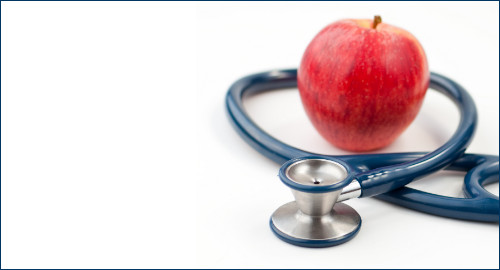Healthy eating tips for older adults, from Aspire Health Coaches
Aspire members have access to a Health Coach as they work toward their health goals, including learning how to improve their diets. This March, for Nutrition Month, we asked our Aspire Health Coaches to share their expertise on the basics of healthy eating.
What types of food are most important to eat as we get older?
According to Health Coach Julian Echeverry, a few key types of foods are especially important as we get older. These include whole foods like lean proteins, non-starchy vegetables, whole grains, dairy or dairy alternatives, and fruit. Health Coach Nicole Jurgens adds that fiber is often lacking in the American diet.
Here are some ideas from our coaches on how to be sure you get these important foods in your diet:
Add beans and lentils to soups and salads for more protein.
- Vary what you buy to incorporate many colors and types of vegetables.
- Check nutrition labels for at least three grams of fiber per serving – especially grains such as cereal, bread, snacks, and pasta.
What nutrients do we need more of and how do we get them?
As we get older, it’s especially important to get daily vitamins. Coach Julian suggests focusing on this list of vitamins and how to get them:
- Calcium from low fat dairy or dairy alternatives, cooked spinach, Brazil nuts, and tofu
- Magnesium from green vegetables, whole grains, legumes, nuts and seeds, and avocado
- Vitamin D from fish oils and oily fish, egg yolks, liver, and sunshine (10-15 minutes)
- Phosphorus from dairy or dairy alternatives, eggs, soybeans, fish, nuts, and whole grains
- Iron from meat, poultry, fish, eggs, legumes, and dark green vegetables
- Vitamin C from citrus fruits, cruciferous vegetables, berries, tomatoes, and bell peppers
What foods should we avoid?
In general, we should avoid fast food, processed food, and fatty foods. More specifically, Coach Julian says, older adults should avoid “empty-calorie foods.” Empty calorie – or “junk” – foods are those that fill you up some but provide little or no nutritional value. Coach Nicole recommends reading nutrition labels and asking yourself if you recognize the ingredients. If you do not, that item may be one to limit or avoid.
What are some habits that encourage healthy eating?
Coach Nicole suggests, “Be open to change. Our mindset when it comes to habit and routines is very influential on our actual behavior. If we focus on how things might be difficult, it may decrease our ability to succeed, rather than focusing on the positive ways our life will change. Believe in your ability to change. Know that any habit can become ‘our new normal.’ It just takes time.”
It’s also a good idea to be mindful of hunger. As Coach Julian says, “When enjoying a meal, it is best to stop eating when you feel about 80% full. Research tells us that after eating a meal or snack, it takes about 20 minutes for satiety (or fullness) signals to reach the brain from the stomach. Stopping at 80% fullness gives the brain time to catch up.”
Finally, make it as easy as possible to make the healthy choice. Coach Nicole says that if eating healthy is always more difficult or time consuming than eating poorly, it’s easy to get off track. Keep a variety of healthy snacks and foods at home and try not to keep foods you’d like to avoid on hand.
How can we stay healthy while eating out or using meal prep services?
While eating out, be mindful of portion sizes. Coach Julian says, “Try asking for a to-go box with your entrée. Then when you are served, immediately put half of the meal into the to-go box. More often than not, portion sizes at restaurants are twice the size compared to what is adequate and ‘calorie-smart.’ Additionally, what you paid for one entrée will serve as two separate meals.”
For meal prep services, Coach Nicole recommends selecting meals with at least 25-50% of the portion as vegetables and with fewer simple carbohydrates (carbohydrates without fiber) like white bread, white pasta, white potatoes, or white rice. Coach Julian says you can use the “My Plate” model as a template:
- Half of a plate filled with non-starchy veggies
- One fourth of a plate filled with lean protein
- One fourth of a plate filled with whole grains or starchy vegetables
- A small portion of dairy
Do other lifestyle changes influence healthy eating habits?
Coach Nicole says, “Lifestyle changes, including exercise, sleep hygiene, and social well-being, are just as vital to our health as nutrition. Not only do they independently support your health and well-being, but one positive change often leads to another and a larger positive momentum as a whole.”
Coach Julian says, “Studies show that an active lifestyle enhances mood and sleep quality among many other health benefits. With improved sleep, we achieve greater restfulness. When we are well rested, we have a greater opportunity to behave with our lifestyle habits in a positive way, whether that be putting more time and effort into preparing healthful meals or increased positive social interactions with those we encounter. With positive social interactions comes fulfillment, purposefulness, happiness, new opportunities, and more.”
What is the advantage of having a Health Coach when improving your eating habits?
Coach Julian says, “The biggest advantage to having a Health Coach is having an accountability partner to work with as you create personalized, realistic, and sustainable goals with around your lifestyle. Your Health Coach can provide very useful tools that can be utilized to make habit change easier and even more enjoyable as an overall growth experience.”
Working with an Aspire Health Coach is a personalized experience that improves awareness. As Coach Nicole says, “Health coaches aren’t meant to tell you what to do, point out mistakes, or give you information you already know. A coach is here to listen to how you feel about where you are now, highlight opportunities and options, and identify actionable steps to make and sustain change. Reflecting on our current habits with a coach from an objective, non-judgmental standpoint, gives you more knowledge about how things could be different moving forward.”
We hope these tips can help you start working towards your goals for healthy eating during Nutrition Month and all year round. If you’d like to take advantage of the personalized help from our Health Coaches, fill out our health coach interest form or contact Member Services at (855) 570-1600. TTY users call 711.
H8764_MKT_HealthyEating_Blog_0323_C










